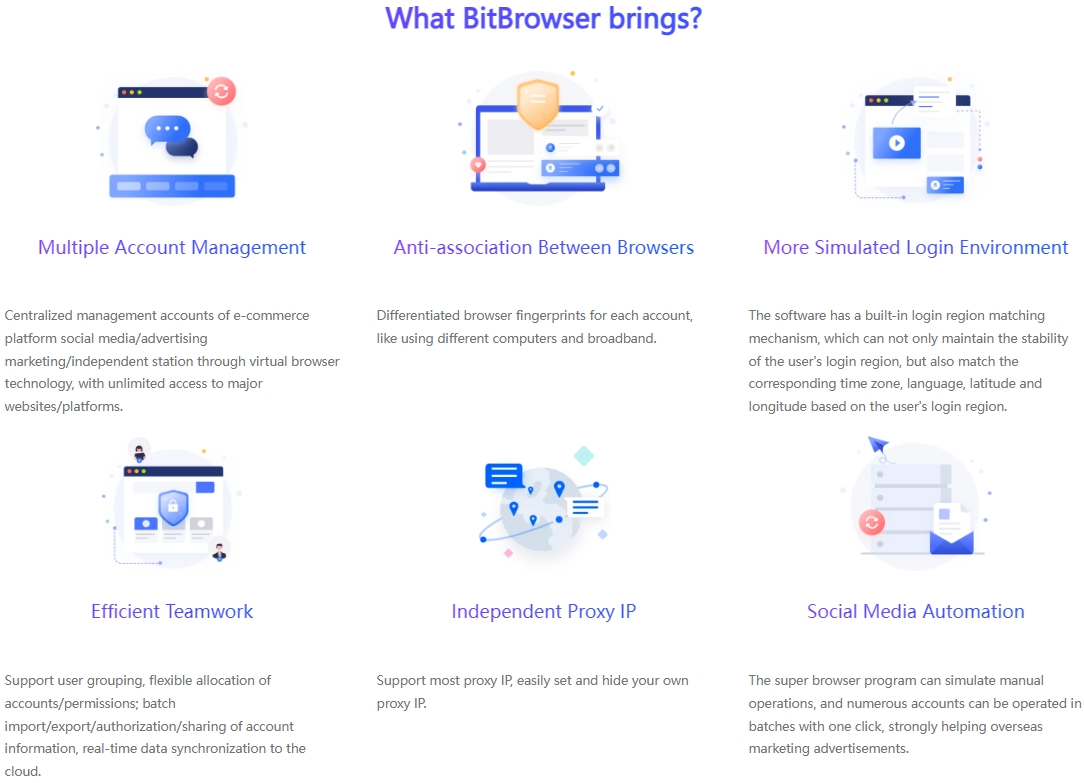
Hot Picks
How to run Facebook ads in 2025? Ideas

Hot Picks
How to promote on Amazon? Sharing various promotion methods

Hot Picks
Choose BitBrowser for fingerprint browsers, and look for the only official website: bitbrowser.cn
How do you choose a proxy? About exclusive IP and native IP
Time: 2024-08-01 11:12 Click:

When discussing network technology and related services, the two expressions "exclusive IP" and "native IP" often come into our view. Although in certain specific situations, they may be regarded as similar or related, in fact, they have different connotations and application scenarios. The purpose of this article is to distinguish the concepts of exclusive IP and native IP, so as to help readers better understand the differences and connections between them.
Definition
Exclusive IP: Exclusive IP means that an IP address is used by only one user or device. This means that the user has full control over the IP and can manage all activities on the IP independently, providing a high degree of independence and autonomy. In the fields of games, server rental, etc., exclusive IP is often used to ensure the quality of network communication and avoid interference and conflicts from other devices.
Native IP: Native IP refers to the IP address directly assigned to users by Internet Service Providers (ISPs). These IP addresses are unique worldwide and can be used to access resources and services on the Internet. Native IP emphasizes the direct allocation and authenticity of IP addresses, which usually reflects the actual geographical location and network connection of users. They are allocated by ISPs based on the user's network needs and geographic location to ensure the stability and reliability of network connections.
Features
Exclusive IP:
Exclusivity: An IP address is used by only one user or device.
Independence: The user has full control over the IP and can manage it independently.
High network communication quality: Avoids interference and conflicts from other devices.
Native IP:
Direct allocation: Assigned directly to the user by the ISP without going through a proxy server or other intermediate devices.
Authenticity: Reflects the user's actual geographic location and network connection.
High network performance and stability: Since no additional address translation is required, it has higher network performance and stability.

How to distinguish between native IP and exclusive IP?
Exclusive IP, as the name suggests, refers to an IP address that is exclusively used by a single user or device. This exclusivity provides users with higher network control and security, especially in scenarios where an isolated environment or IP conflict needs to be avoided. However, exclusive IP is not necessarily equivalent to native IP. It may be processed by certain technologies, such as through proxy or VPN services to achieve independent use.
In contrast, native IP emphasizes its characteristics of being tamper-free and directly assigned by Internet service providers (ISPs). Native IP is like the "identity card" of the network world, which directly reflects the user's network access location and identity, and has a high degree of authenticity and traceability. In scenarios such as home broadband and direct enterprise access to the Internet, native IP is a common network identity, which ensures that users can communicate directly and quickly with other nodes on the Internet.
Although exclusive IP and native IP have some overlaps in some aspects, such as both can improve network security and user privacy protection, their essential difference lies in the diversity of generation paths and application scenarios. Exclusive IP focuses more on exclusive control of IP resources, while native IP emphasizes its purity and directness. Therefore, when choosing which IP to use, users need to make reasonable decisions based on their actual needs and scenarios.

Application scenarios of native IP and exclusive IP
Game industry
In the game industry, exclusive IP is widely used in the deployment of game servers and game consoles. By assigning independent IP addresses to each game server, game operators can ensure stable and smooth network communication between players, avoiding problems such as game freezes and disconnections caused by network congestion or conflicts. At the same time, exclusive IP can also improve the security of the game and reduce the incidence of plug-ins and cheating.
E-commerce
E-commerce is another industry that widely uses exclusive IP and native IP. In order to bypass geographical restrictions and access website resources in specific countries or regions, cross-border e-commerce companies usually use exclusive IP or native IP to build their own network architecture. Exclusive IP can help companies establish an independent network environment and improve the stability and security of network communication; while native IP can ensure that companies comply with local laws and regulations and enhance brand image and credibility.

Proxy IP Unlimited Browser
In the process of operating multiple stores, especially when cultivating accounts on social platforms such as Facebook and TikTok, any subtle details play a decisive role. In this case, the importance of the Proxy IP Unlimited Browser is highlighted. The Proxy IP Unlimited Browser is a powerful multi-account management tool specially designed for social media marketing and cross-border e-commerce.
The Proxy IP Unlimited Browser not only supports a variety of proxy network settings, allowing each account to connect with a specific residential IP, but also adjusts and disguises the browser fingerprint, covering the operating system, browser category, resolution, font and many other browser features. This extreme customization makes each account independent and unique in front of the platform, greatly reducing the possibility of being detected and associated.
Using the Proxy IP Unlimited Browser with the native IP brings significant advantages to multi-account operations. The native IP provides a stable IP address, which behaves exactly like a real user on the network, which effectively avoids the account being blocked due to abnormal behavior detected by the platform. BitBrowser gives each account a unique fingerprint, and the static residential IP gives these accounts a trustworthy network identity. The combination of the two builds a solid foundation for the long-term development and maintenance of the account.
Summary:
Exclusive IP and native IP are two terms with different meanings and different application scenarios. Exclusive IP focuses on the exclusive use of IP addresses, as well as the resulting security, privacy protection and SEO advantages; native IP emphasizes its authenticity, stability and regional characteristics. When we choose network services, it is extremely important to understand the differences and connections between these two terms in order to make wise and appropriate choices.

 Multi-Account Management
Multi-Account Management Prevent Account Association
Prevent Account Association Multi-Employee Management
Multi-Employee Management



